Solve puzzles in a recursive world where everything is simultaneously tiny and massive
Maquette would leave M.C. Escher scratching his head.
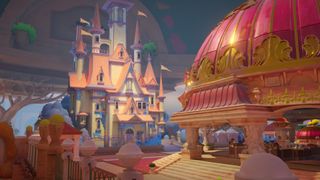
Maquette is one of those games that wants to grab your mind, clasp it firmly and, like a circus strongman with a penny, fold it over on itself. It's a first-person puzzle game which, much like Portal or Antichamber, takes the laws of physics and staples a cheeky addendum to it. In this case, recursion.
Okay, recursion. This is going to require a degree of rushed exposition usually not experienced outside of Christopher Nolan movies.
Maquette's levels are formed in a cross shape with four buildings at each compass point and a large dome in the centre, like the roof of an especially ornate merry-go-round. Step inside and you'll find a smaller replica of the level you're standing in, a model village with—what else—a miniature dome at the centre. Back outside, if you look up at the curved sky, you'll realise you're inside a dome too. Beyond that dome, if you squint at the horizon, you'll just about make out the enormous pillars holding up yet another dome, and the fuzzy shadow of another beyond that one. It's domes all the way down, and all the way up—and vitally, every single action you make is reflected along the entire chain.
Say you're presented with the most quintessential of videogame items: a lock and key. Except the key is tiny, the kind Sylvanian Families use to secure their dollhouse homes. Try and put it inside this stubbornly normal-sized lock and it'll just wiggle around ineffectually. But drop that key onto the wee pavements of the model village, then turn around to that same spot in your world and… voila! A normal-sized key for a normal-sized lock.
Next, imagine taking that normal-sized key and placing it into the small world. It looks freakishly large among these tiny houses, right? Now think: if you were to turn around and look outside the dome, what would you expect to see? If you've just pictured the pavements straining beneath the weight of an enormous key, then good work: now you're thinking with recursion.
You're probably already getting a sense of the puzzles that can be spun out of this. Maybe you take that giant key and use it as a makeshift bridge, letting you reach a previously inaccessible door. But, ah—when you get there, the door's locked, and the only key in the entire level is the one you're currently standing on.
This is the first big mental leap Maquette asks you to make, and I won't spoil the answer here, but it's important to stress that it really is the first—the initial hop along the way to a triple jump, launching your brain into the sky. Wa-haa!
The biggest gaming news, reviews and hardware deals
Keep up to date with the most important stories and the best deals, as picked by the PC Gamer team.
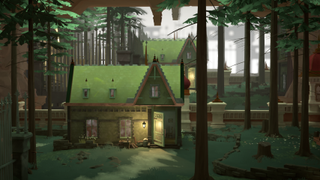
"I tried really hard not to do any softball puzzles," designer Hanford Lemoore says, as he demonstrates a couple of early solutions that, I'll admit, helped me get a handle on my own playthrough. After a few easy tutorial puzzles to help you acclimatise to the rules of its world, Maquette quickly starts cranking up the difficulty. "That's the fun of this type of game, I think—where you start off with this world that seems mind-bending and incomprehensible in some ways. And then as you play through the game, you learn how it works. And then by the end, you understand it in a way you didn't before."
Labour of love
So yeah, Maquette is set to give all of our melons a good twisting. But it's also keen to go for your heart, with a story that begins with a meetcute in a San Francisco coffee shop and follows a blossoming relationship. At least, it's blossoming in the early chapters I get to play—the whole thing is being told retrospectively, as your character sifts through old belongings. Which, as anyone with a box of their ex's stuff at the back of a wardrobe will tell you, doesn't tend to suggest things ended happily.
This might not sound like the most obvious narrative fit for a game about manipulating the laws of physics—and it turns out the romance element took Lemoore by surprise too. When he first came up with the recursion concept in 2011, he didn't have a story to accompany it. His early attempts were built around this central mechanic, finding justifications for its existence, whether it was a science experiment or aliens or just 'a wizard did it', but Lemoore just couldn't get excited about any of them. He stepped away, started writing short stories for his own enjoyment. Until one, a relationship story, caught his attention.
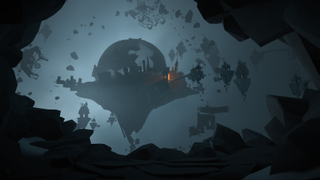
So what made him think these two things would fit together? "They didn't," he says. "And that's actually what was compelling to me. That was the spark I needed." It's not an entirely random combination, though—by the time he wrote this story, he'd already planned out all the game's levels, and was surprised to discover how naturally the two fit together.
He's not saying any more than that, for now, but the world you're exploring really feels like it's being constructed out of that box of memories. You'll visit abstract versions of places the couple went on dates, and others lifted straight out of the sketchbook they doodled in together. The result is like a Disneyland version of the San Francisco setting, the parapets of a theme-park castle overlooking buildings inspired by the city's iconic Painted Ladies and Mission architecture—and, of course, a big old nod to the domed Palace of Fine Arts.
Witness me
The other reference point that leaps to mind here is The Witness. There's a similar painterly style to the visuals, a use of colour that ties together each area's buildings and flora with a strong identity. But unlike on The Witness's island, there's no option to wander away from a headscratcher and try something else. The four spokes from that domed hub unlock in a strictly linear fashion, only giving you access to the locations required for the current puzzle.
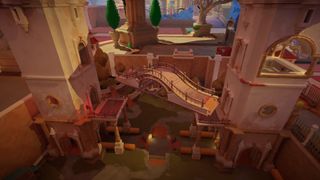
With Lemoore's stated lack of interest in ball-softening, I can't help but wonder if there's a risk of players getting stuck—won't that piss on the chips of his carefully-constructed story a bit? "I'm assuming that, y'know, YouTube will be there." He laughs, but admits this isn't a perfect system. "Solutions are easy to come by on the internet, but good hints that don't give away too much, there's an art to creating those."
It's an art he'd like to dabble in himself, but a built-in hint system is more "maybe someday" than a feature on the to-do list. In the meantime, though, Lemoore offers another suggestion: "I always tell people, play with someone else." At shows like PAX, he'd see groups of two or three friends huddled around the same monitor, all offering ideas to the person on the controls. "I actually think that's the best way when you're stuck."
I decide to take him up on this idea. Luckily, I'm married to someone significantly smarter than I am, so I rope her in to be my over-the-shoulder suggestion shouter. It's at this point that the story really becomes a romance, as far I'm concerned. There's no sign of true love quite like finishing each other's puzzle solutions, the half-ideas in each of your brains fitting snugly into one another. With a companion, the difficulty of puzzles feels perfectly pitched—at least, in the first two chapters I have access to.
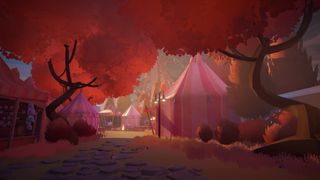
In the demo, Lemoore gives little teases of what's ahead. He takes us out beyond the reaches of that initial domed sky, at which point everything goes a bit Honey I Shrunk The Kids, and suggests that you'll even get a chance to explore the world outside of that dome. "I think a lot of people do wonder, 'OK, how much can you do with this recursion mechanic, making things bigger and smaller?' Oh, we can do a lot. And even after we've explored that, we mix it up in new ways that people might not have been expecting."
He delivers on that promise with a quick glimpse of a moment much later in the game, where the familiar world has been shattered. The dome is floating in the void, snapped off at all four compass points, orbited by broken-up bits of level. Things aren't looking too rosy for that romance story—or for my own puzzle-solving duo, to be honest, just about getting to grips with the rules of recursion—but it's good to see that Maquette has plenty more ways of folding our brains in on themselves.
Maquette is launching on Steam on March 2.
Most Popular

